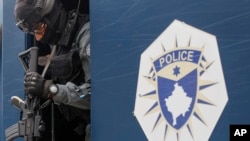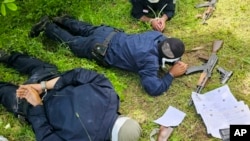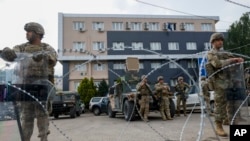A court in Serbia released three police officers from Kosovo who were detained near the disputed border between the former war foes, but a Serbian negotiator said Monday that the trio still faced further legal action.
The officers returned to Kosovo after a court in the central Serbian town of Kraljevo said they would be allowed to remain free pending any additional proceedings. They were charged with illegal possession of weapons and explosive devices, the court said.
The officers were detained in mid-June. Serbia says the three crossed into the country from Kosovo, while Kosovar authorities insisted they were kidnapped inside Kosovo and transferred to a Serbian prison.
The United States and the European Union had joined Kosovo's government in demanding their freedom.
Serbia's chief negotiator with Kosovo, Petar Petkovic, said the officers' release from detention was a court decision "and not a political one." An investigation and their possible prosecution will continue, Petkovic said.
Kosovo's president, Vjosa Osmani, thanked the United States for securing the policemen's release "after the act of aggression that Serbia did in Kosovo." Officials said they wanted Serbia held responsible for the alleged incursion into Kosovo's territory.
"Even though we are joyous that they get to return to their families, this abduction consists of a serious human rights violation & must be reprimanded," Prime Minister Albin Kurti tweeted.
Serbia and its former province, Kosovo, have been at odds for decades, with Belgrade refusing to recognize Kosovo's 2008 declaration of independence. Western efforts to resolve the crisis have increased recently to avert possible instability in the Balkans as war rages in Ukraine.
Tensions between the two countries flared anew late last month after Kosovo police seized local municipal buildings in Serb-majority northern Kosovo to install ethnic Albanian mayors who were elected in an April election that Serbs overwhelmingly boycotted.
Violent clashes and the detention of the police officers stirred fears of a renewal of a 1998-99 conflict that left more than 10,000 people dead, mostly Kosovar Albanians.
Serbia has demanded that Kosovo special police units and the mayors pull out from the northern region bordering Serbia and also for several ethnic Serbs who were detained in Kosovo in recent weeks to be released. The Serbian government also heightened army readiness and threatened military intervention over the alleged "torture" of ethnic Serbs in Kosovo.
In response to Kosovo taking over the municipal buildings, the United States canceled the country's participation in a U.S.-led military exercise, and top Western officials halted high-level visits to Pristina.
Last week, the European Union summoned the leaders of Kosovo and Serbia to Brussels to urge them to defuse the situation. European Union foreign policy chief Josep Borrell hailed Monday's release of the officers.
Borrell warned that the EU's executive commission and member countries were ready to take political and financial measures against Serbia and Kosovo if they did not commit to a de-escalation.
He did not list specific expected steps or possible measures but said the 27-nation bloc had "bodies that work on that" and "means to execute."
Borrell on Monday repeated that holding fresh local elections in four Serb-majority municipalities was essential to reducing the tensions.
The U.S. and most EU members have recognized Kosovo's independence, while Russia and China have backed Belgrade's claim to the territory. Serbia lost control over Kosovo after NATO intervened in 1999 to stop the war, forcing Belgrade to end a brutal crackdown against separatist ethnic Albanians.






